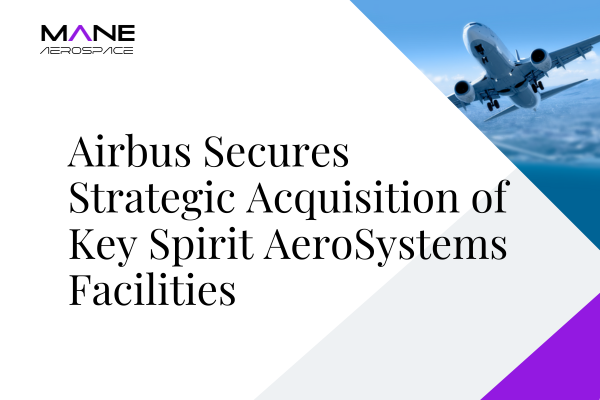Airbus Secures Strategic Acquisition of Key Spirit AeroSystems Facilities
22 May, 20252 minsIn a significant move that reshapes the aerospace manufacturing landscape, Airbus SE has fin...

In a significant move that reshapes the aerospace manufacturing landscape, Airbus SE has finalised a definitive agreement to acquire several key industrial facilities from Spirit AeroSystems. The deal, announced on April 28, 2025, is set to enhance Airbus's supply chain stability for its commercial aircraft programmes while creating important implications for the aerospace talent market.
Strategic Assets Changing Hands
The acquisition encompasses multiple manufacturing sites across the globe that are critical to Airbus's aircraft production. Under the agreement, Airbus will take ownership of:
- The Kinston facility in North Carolina, USA, which produces fuselage sections for the A350
- Operations in St. Nazaire, France, also responsible for A350 fuselage components
- The Casablanca site in Morocco, which manufactures components for the A321 and A220
- A220 pylon production in Wichita, Kansas
- The Belfast facility in Northern Ireland, which produces A220 wings
- Production of wing components for the A320 and A350 in Prestwick, Scotland
The agreement also includes provisions for the possible acquisition of A220 mid-fuselage production in Belfast, contingent on whether Spirit AeroSystems identifies a suitable buyer for that portion of the site.
This strategic acquisition comes as part of broader industry restructuring, coinciding with Boeing's $8.3 billion acquisition of Spirit AeroSystems, a company it had previously spun off in 2005.
Financial Framework of the Deal
The transaction includes a unique financial arrangement where Airbus will receive $439 million from Spirit AeroSystems, subject to adjustments at closing. Additionally, Airbus has agreed to provide Spirit with $200 million in non-interest-bearing credit lines to support ongoing Airbus programmes.
The conditions and financial impact align with Airbus's 2025 guidance, as issued in February 2025. The transaction is expected to close in the third quarter of 2025, pending regulatory approvals and other customary conditions.
Workforce and Talent Implications
This acquisition carries significant implications for the aerospace talent landscape, particularly in the UK where the Belfast facility represents Northern Ireland's largest manufacturing site with approximately 3,000 employees.
The transfer of these facilities raises important questions about workforce integration, talent retention, and the development of skills needed for future aerospace manufacturing. As the industry continues to face challenges in recruiting and retaining skilled workers, companies like Airbus must develop comprehensive talent strategies to ensure the successful integration of these acquired operations.
For recruitment specialists and talent acquisition professionals in the aerospace sector, this deal presents both challenges and opportunities. The consolidation of manufacturing facilities may lead to a redistribution of specialised aerospace talent, potentially creating new hiring needs and career pathways for skilled workers.
As the aerospace industry continues to evolve with increasing focus on sustainability, digitalisation, and advanced manufacturing techniques, aerospace companies will need to invest in upskilling their workforce and attracting new talent with expertise in emerging technologies. The successful integration of these acquired facilities will depend heavily on effective talent management strategies.
Looking Forward
The acquisition represents Airbus's commitment to ensuring stability in its supply chain, a critical factor in meeting production targets for its commercial aircraft programmes. By bringing these key facilities under direct control, Airbus aims to create a more sustainable operational and financial pathway for these essential work packages.
For aerospace professionals, this consolidation signals the importance of adaptability in a rapidly changing industry landscape. As manufacturing operations are transferred and potentially transformed, those with the right combination of technical skills, adaptability, and innovation mindset will be best positioned to thrive.
Recruitment specialists and HR leaders in aerospace companies should closely monitor these industry shifts, preparing talent acquisition and retention strategies that address the evolving needs of the sector. As the industry continues to transform, partnerships between aerospace manufacturers, educational institutions, and workforce development organisations will become increasingly important in building the skilled workforce needed for the future of aviation.
The closing of this significant transaction, expected in the third quarter of 2025, marks not just a transfer of physical assets but also a strategic realignment of the talent and expertise that powers the global aerospace manufacturing ecosystem.



